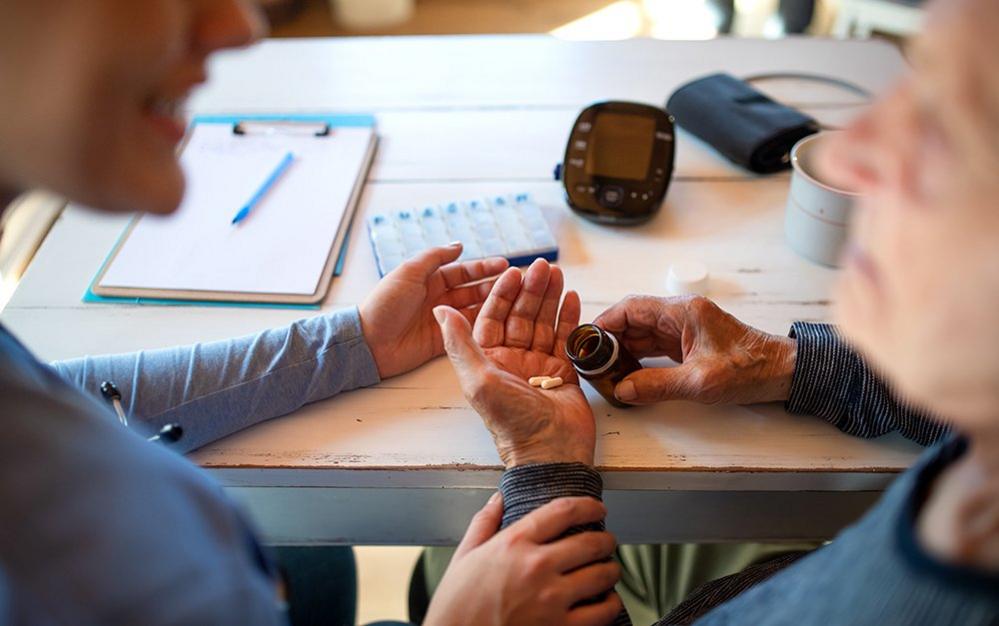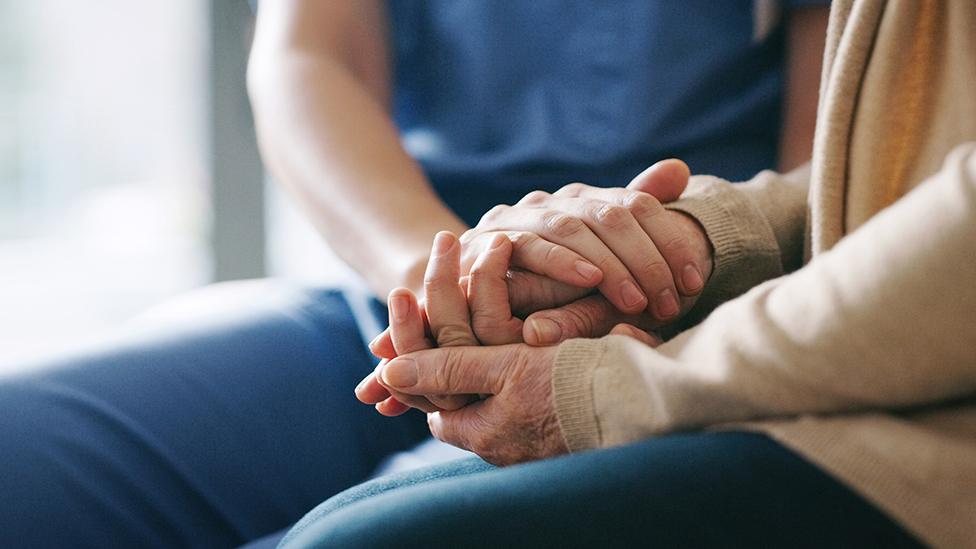Modern slavery helpline calls surge from care staff
- Published

A national helpline for victims of modern slavery is reporting a steep rise in calls from overseas workers who came to the UK to help plug staffing gaps in the care sector.
Many said they had paid huge sums to the people who brought them over after visa rules changed last year.
Unseen UK said more than 700 care staff used its helpline in 2022.
Ministers say they "strongly condemn" offering foreign care workers employment "under false pretences".
The charity's latest figures show:
in 2021 its helpline was contacted about 15 cases of modern slavery in the care sector, involving 63 potential victims
by 2022 there were 106 cases, involving 708 potential victims
in 2023 the figures have continued to rise
Nearly one in five potential modern-slavery victims identified by the charity in 2022 worked in the care sector.
The report, published on Monday,, external says some workers are being charged thousands of pounds for travel to the UK and sponsorship certificates.
The cost of sponsorship is a few hundred pounds, which is met by most care companies - but the charity says a few unscrupulous employers and agents are charging workers as much as £25,000, adding interest and deducting the debt from their wages.
"It becomes evident that workers are in a cycle where they will never be able to pay off the debt," says the report.

Divya, whose name has been changed by the charity to protect her identity, called the helpline after arriving in the UK from India to work in home care.
She said she was housed with four other care workers, their passports were taken and they had to sign a three-year contract with the care company. She claimed she would finish one 12-hour shift and be taken by her employer straight to the next 12-hour shift.
The report says a concerned client let her sleep during a shift and gave her food, as she was not earning enough money to buy provisions.
Janet, whose name has also been changed, came from Zimbabwe and told the helpline she was charged £10,000 by her employer for a certificate of sponsorship. Sometimes she worked 18-hour shifts, 10 days in a row.
Visa changes
In February 2022, the government made care work a "shortage" occupation, allowing more people to be recruited from abroad to work in care homes or home care, aiming to tackle a record 164,000 social-care vacancies in England in 2021/22.
Vacancies have since fallen slightly, largely as a result of nearly 70,000 people arriving in the UK to work in care, according to Skills for Care, external.
Unseen's chief executive, Andrew Wallis, says the current approach has led to a rise in "labour abuse and exploitation" and is "a disaster" for many workers.
"Very vulnerable people are being cared for by very vulnerable people," he adds.
Care providers have told BBC News some overseas staff are emailing them or arriving at their offices asking if they can take them on because the company that brought them to the UK is either giving them no work or not enough for them to survive.
Fearing deportation
Mary Anson, who runs five care homes in Cornwall, says she was approached by two overseas care workers who were brought to the UK by a home-care company but given no work. Ms Anson is now trying to take over their sponsorship.
She says overseas care workers are terrified they will be deported if they tell anyone how they were treated.
"They need to have somewhere safe to report what is going on."
She has recruited 20 people from abroad who are "skilled and caring" but questions whether some of the companies who have been recruiting from abroad "are real care providers".
Jane Townson, from the Homecare Association, says there has been an influx of new agencies in some areas.
"We need a co-ordinated approach to commissioning, registration of services and granting of Skilled Worker Visas in home care," she argues.
Cathie Williams, joint-chief executive of the Association of Directors of Adult Social Services, says most providers of council-funded care have taken an ethical approach. "But clearly there are unscrupulous individuals and organisations using the current system to exploit people."
Ms Williams wants the rules for issuing visa licences to organisations tightened but says, longer-term, the only way "to get a grip on the social-care staffing crisis is by improving pay and working conditions".
The government says overseas care workers in the UK should be paid at least the required minimum salary and has published a recruitment code of practice, external.
"The government does not tolerate illegal activity in the labour market and any accusations of illegal employment practices will be thoroughly looked into," said an official.
"Those found operating unlawfully may face prosecution and/or removal from the sponsorship register."

Are you personally affected by the issues raised in this story? Please share your experiences by emailing haveyoursay@bbc.co.uk, external.
Please include a contact number if you are willing to speak to a BBC journalist. You can also get in touch in the following ways:
WhatsApp: +44 7756 165803
Tweet: @BBC_HaveYourSay, external
Please read our terms & conditions and privacy policy
If you are reading this page and can't see the form you will need to visit the mobile version of the BBC website to submit your question or comment or you can email us at HaveYourSay@bbc.co.uk, external. Please include your name, age and location with any submission.